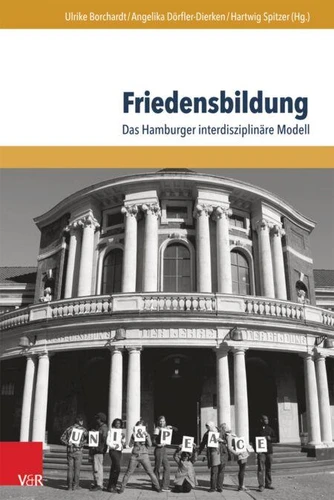Friedensbildung. Das Hamburger interdisziplinäre Modell
Par : , , , ,Formats :
Disponible dans votre compte client Decitre ou Furet du Nord dès validation de votre commande. Le format PDF est :
- Compatible avec une lecture sur My Vivlio (smartphone, tablette, ordinateur)
- Compatible avec une lecture sur liseuses Vivlio
- Pour les liseuses autres que Vivlio, vous devez utiliser le logiciel Adobe Digital Edition. Non compatible avec la lecture sur les liseuses Kindle, Remarkable et Sony
 , qui est-ce ?
, qui est-ce ?Notre partenaire de plateforme de lecture numérique où vous retrouverez l'ensemble de vos ebooks gratuitement
Pour en savoir plus sur nos ebooks, consultez notre aide en ligne ici
- Nombre de pages325
- FormatPDF
- ISBN978-3-8470-0244-4
- EAN9783847002444
- Date de parution18/06/2014
- Protection num.pas de protection
- Taille3 Mo
- Infos supplémentairespdf
- ÉditeurV&R Unipress
Résumé
Conflict is inevitable. Violence is not. Peacebuilding is an essential element and precondition for transforming war-ridden and violent societies towards constructive ways of conflict resolution. Peacebuilding requires processes, attitudes and capabilities on the individual, societal and institutional level. This volume approaches the issues from a special perspective. It presents the essence of lectures given at University of Hamburg by experts from different academic fields - political science, psychology, theology, sociology, anthropology and the arts.
The lectures aimed at enhancing the understanding of students in the areas of conflict dynamics, peace processes and preventive work based on case studies, like the German peace movement in the 1980s, the peace process in Northern Ireland, trauma rehabilitation work with former child soldiers and the concept and practice of restorative justice, to name a few. The volume thus goes beyond an understanding of peacebuilding which focusses on nation and institution building.
The lectures aimed at enhancing the understanding of students in the areas of conflict dynamics, peace processes and preventive work based on case studies, like the German peace movement in the 1980s, the peace process in Northern Ireland, trauma rehabilitation work with former child soldiers and the concept and practice of restorative justice, to name a few. The volume thus goes beyond an understanding of peacebuilding which focusses on nation and institution building.
Conflict is inevitable. Violence is not. Peacebuilding is an essential element and precondition for transforming war-ridden and violent societies towards constructive ways of conflict resolution. Peacebuilding requires processes, attitudes and capabilities on the individual, societal and institutional level. This volume approaches the issues from a special perspective. It presents the essence of lectures given at University of Hamburg by experts from different academic fields - political science, psychology, theology, sociology, anthropology and the arts.
The lectures aimed at enhancing the understanding of students in the areas of conflict dynamics, peace processes and preventive work based on case studies, like the German peace movement in the 1980s, the peace process in Northern Ireland, trauma rehabilitation work with former child soldiers and the concept and practice of restorative justice, to name a few. The volume thus goes beyond an understanding of peacebuilding which focusses on nation and institution building.
The lectures aimed at enhancing the understanding of students in the areas of conflict dynamics, peace processes and preventive work based on case studies, like the German peace movement in the 1980s, the peace process in Northern Ireland, trauma rehabilitation work with former child soldiers and the concept and practice of restorative justice, to name a few. The volume thus goes beyond an understanding of peacebuilding which focusses on nation and institution building.



